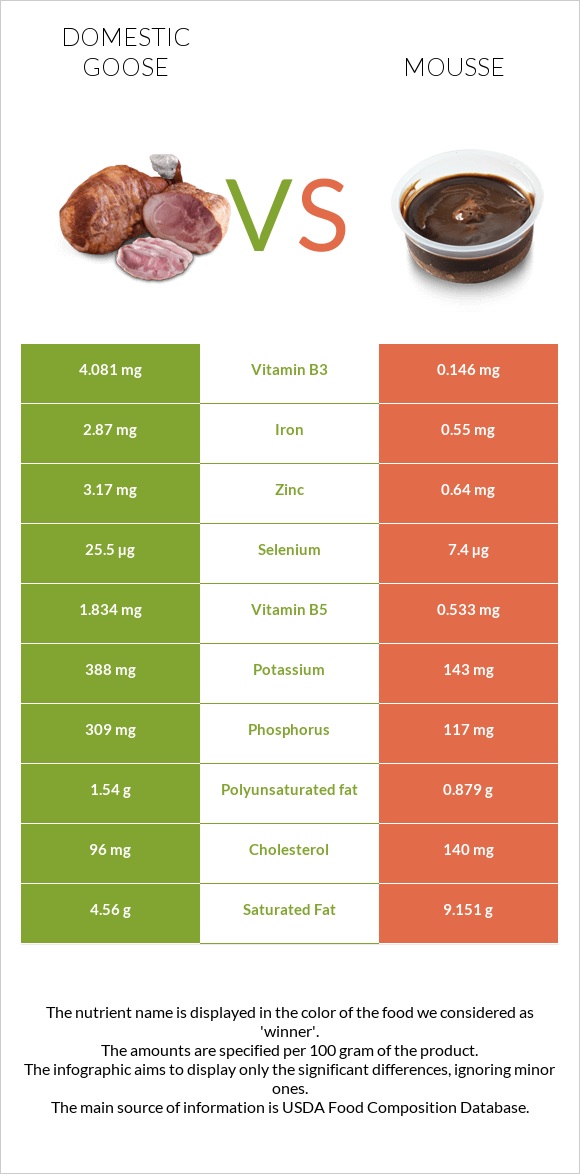Domestic goose vs. Mousse — In-Depth Nutrition Comparison
Compare
Differences between domestic goose and mousse
- Mousse contains less selenium, vitamin B6, iron, phosphorus, vitamin B5, vitamin B3, zinc, and copper than domestic goose.
- Domestic goose's daily need coverage for selenium is 33% higher.
- Mousse contains 28 times less vitamin B3 than domestic goose. Domestic goose contains 4.081mg of vitamin B3, while mousse contains 0.146mg.
- The amount of cholesterol in domestic goose is lower.
- Domestic goose has a lower glycemic index. The glycemic index of domestic goose is 0, while the glycemic index of mousse is 42.
The food types used in this comparison are Goose, domesticated, meat only, cooked, roasted and Desserts, mousse, chocolate, prepared-from-recipe.
Infographic

Infographic link
Mineral Comparison
Mineral comparison score is based on the number of minerals by which one or the other food is richer. The "coverage" charts below show how much of the daily needs can be covered by 300 grams of the food.
| Contains more MagnesiumMagnesium | +25% |
| Contains more PotassiumPotassium | +171.3% |
| Contains more IronIron | +421.8% |
| Contains more CopperCopper | +268% |
| Contains more ZincZinc | +395.3% |
| Contains more PhosphorusPhosphorus | +164.1% |
| Contains more SeleniumSelenium | +244.6% |
| Contains more CalciumCalcium | +585.7% |
| Contains less SodiumSodium | -50% |
| Contains more ManganeseManganese | +145.8% |
Vitamin Comparison
Vitamin comparison score is based on the number of vitamins by which one or the other food is richer. The "coverage" charts below show how much of the daily needs can be covered by 300 grams of the food.
| Contains more Vitamin B1Vitamin B1 | +104.4% |
| Contains more Vitamin B2Vitamin B2 | +90.2% |
| Contains more Vitamin B3Vitamin B3 | +2695.2% |
| Contains more Vitamin B5Vitamin B5 | +244.1% |
| Contains more Vitamin B6Vitamin B6 | +710.3% |
| Contains more Vitamin CVitamin C | +∞% |
| Contains more Vitamin AVitamin A | +1066.7% |
| Contains more FolateFolate | +25% |
All nutrients comparison - raw data values
| Nutrient |  |
 |
DV% diff. |
| Protein | 28.97g | 4.14g | 50% |
| Selenium | 25.5µg | 7.4µg | 33% |
| Vitamin B6 | 0.47mg | 0.058mg | 32% |
| Iron | 2.87mg | 0.55mg | 29% |
| Phosphorus | 309mg | 117mg | 27% |
| Vitamin B5 | 1.834mg | 0.533mg | 26% |
| Vitamin B3 | 4.081mg | 0.146mg | 25% |
| Zinc | 3.17mg | 0.64mg | 23% |
| Copper | 0.276mg | 0.075mg | 22% |
| Saturated fat | 4.56g | 9.151g | 21% |
| Cholesterol | 96mg | 140mg | 15% |
| Vitamin A | 12µg | 140µg | 14% |
| Vitamin B2 | 0.39mg | 0.205mg | 14% |
| Calcium | 14mg | 96mg | 8% |
| Potassium | 388mg | 143mg | 7% |
| Fats | 12.67g | 16g | 5% |
| Carbs | 0g | 16.07g | 5% |
| Vitamin B1 | 0.092mg | 0.045mg | 4% |
| Polyunsaturated fat | 1.54g | 0.879g | 4% |
| Vitamin E | 0.51mg | 3% | |
| Fiber | 0g | 0.6g | 2% |
| Sodium | 76mg | 38mg | 2% |
| Manganese | 0.024mg | 0.059mg | 2% |
| Monounsaturated fat | 4.34g | 5.027g | 2% |
| Caffeine | 7mg | 2% | |
| Calories | 238kcal | 225kcal | 1% |
| Magnesium | 25mg | 20mg | 1% |
| Vitamin B12 | 0.49µg | 0.47µg | 1% |
| Vitamin K | 1.6µg | 1% | |
| Folate | 12µg | 15µg | 1% |
| Vitamin C | 0mg | 0.1mg | 0% |
| Net carbs | 0g | 15.47g | N/A |
| Sugar | 14.81g | N/A | |
| Tryptophan | 0.403mg | 0% | |
| Threonine | 1.238mg | 0% | |
| Isoleucine | 1.488mg | 0% | |
| Leucine | 2.447mg | 0% | |
| Lysine | 2.48mg | 0% | |
| Methionine | 0.783mg | 0% | |
| Phenylalanine | 1.214mg | 0% | |
| Valine | 1.516mg | 0% | |
| Histidine | 0.765mg | 0% | |
| Omega-3 - EPA | 0g | 0.001g | N/A |
| Omega-3 - DHA | 0g | 0.01g | N/A |
Macronutrient Comparison
Macronutrient breakdown side-by-side comparison
Protein:
28.97 g
Fats:
12.67 g
Carbs:
0 g
Water:
57.23 g
Other:
1.13 g
Protein:
4.14 g
Fats:
16 g
Carbs:
16.07 g
Water:
62.94 g
Other:
0.85 g
| Contains more ProteinProtein | +599.8% |
| Contains more OtherOther | +32.9% |
| Contains more FatsFats | +26.3% |
| Contains more CarbsCarbs | +∞% |
~equal in
Water
~62.94g
Fat Type Comparison
Fat type breakdown side-by-side comparison
Saturated fat:
Sat. Fat
4.56 g
Monounsaturated fat:
Mono. Fat
4.34 g
Polyunsaturated fat:
Poly. Fat
1.54 g
Saturated fat:
Sat. Fat
9.151 g
Monounsaturated fat:
Mono. Fat
5.027 g
Polyunsaturated fat:
Poly. Fat
0.879 g
| Contains less Sat. FatSaturated fat | -50.2% |
| Contains more Poly. FatPolyunsaturated fat | +75.2% |
| Contains more Mono. FatMonounsaturated fat | +15.8% |





